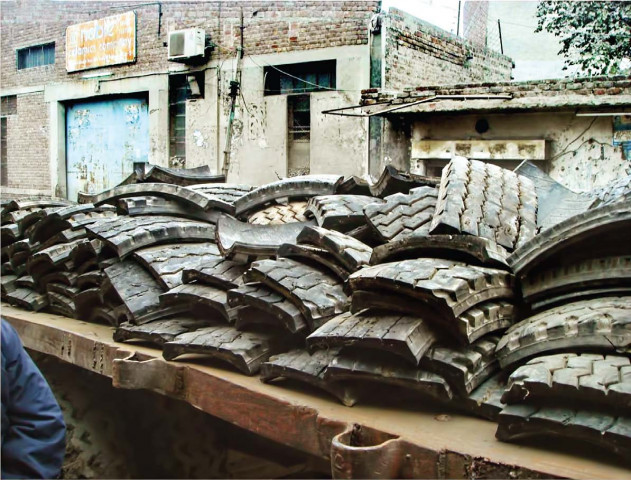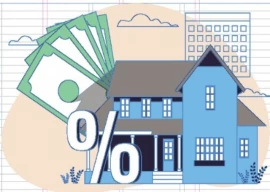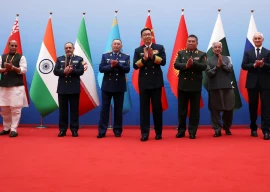
Nadeem Kamboh lives in a crowded 10-marla house with his family, which includes five brothers and their wives and kids, in an area called Shadipura. Like the other residents of this poor northern neighbourhood, they would sleep on the roof to escape the summer heat.
That is, until about five years ago. “Everyone would wake up coughing. Our faces would be covered in soot,” he says, a result of the black smoke being spewed from the many small industrial units in the area.
There are 55 steel rerolling units in Shadipura, recycling iron scrap that is melted down in five furnaces in the area. All 55 have been cited by the Environment Protection Department for using tyres as fuel.
Burning tyres as fuel results in large quantities of carbon, sulphur and dust pollutants being released into the atmosphere. Many of these pollutants are carcinogenic and cause respiratory and other diseases.
But the owners of these factories insist that faced with gas and electricity shortages, they have to continue using tyres as fuel when needed. Officials point out that Shadipura is an industrial area so the residents do not have the right to complain about living conditions there.
“The area will remain a mess until one of the two – the factory owners or the residents – move out,” says Zahid Younas, the deputy district officer for the environment.
Three of thee steel mills were recently de-sealed after they pledged to install scrubbers, which remove pollutants from factory emissions, but 52 are repeat offenders whose case rests with the EPD tribunal.
However, with the tribunal chief retiring at the end of June, there is unlikely to be a swift hearing of the cases. It will take another three to four months to appoint a new head, said an EPD official.
An EPD official said that the factories usually reopened within two or three days of being sealed by an inspector by using connections to influential people.
Kamboh believes the smoke is affecting the health of residents. Shadipura, which has a population of 65,000, has no government hospitals or schools, but it is home to a private gynaecology clinic that opened two years ago. Kamboh says the clinic is inundated with residents complaining of lung problems including asthma.
But the EPD official expressed sympathy with the factory owners and workers. “They have to keep running the factories to make a living. Their employees come from very poor rural households and need money. After a factory owner agrees to sign an undertaking that he will install a scrubber, the officials unseal the factory,” he added.
It is also the worker who is most exposed to the pollutants and thus faces the greatest health risk.
The factory owners themselves say that in a bad economy and faced with gas and power outages, they have no intention of cleaning up their smoke-spewing chimneys. “Business is down these days. Installing a scrubber is not a priority. It is to keep workers employed and the factory running,” said an owner on the condition of anonymity.
He said the mill used tyres as fuel on two days a week because of the unavailability of gas. His factory’s case also rests with the EPD tribunal.
Kamboh says that he has lived in Shadipura for 20 years. He insists it is a residential area and it is the factories that should move out, though he has little hope of this. “I do not see this happening as most of the owners are rich and politically well-connected,” he says.
Younas said according to the Master Plan 2021 for Lahore, Shadipura is an industrial zone and not a residential area. “No houses should have been built there,” he said.
One reason for the confusion is that three separate authorities seem to have a say in planning in the area: the Lahore Development Authority, the tehsil municipal administration and the city government’s planning committee.
“If one authority refuses an appeal for land allocation to construct a house,” says Younas, “the officials of another will accept a bribe to allow it.” Wagha Town Tehsil Municipal Officer Afzal Rihan says the town has never allocated land or allowed construction in Shadipura. “A land grabbing mafia has sold the land illegally,” he said, adding they were reluctant to move residents out for fear of protests. “The situation would get even more out of hand,” he said.
Kamran Tufail, the EPD field inspector for the region, says Shadipura residents also keep switching sides, making the job of his department more complicated. “The residents that complain are paid off by the factory owners to keep quiet,” he said. “A few people who used to nag us relentlessly to take action against the factories now side with the factory owners.”
Published in The Express Tribune, June 20th, 2011.


















COMMENTS
Comments are moderated and generally will be posted if they are on-topic and not abusive.
For more information, please see our Comments FAQ